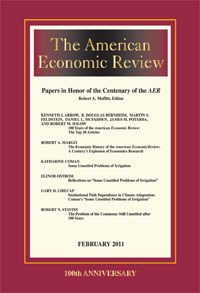
Abdellaoui, M., Baillon, A., Placido, L. and Wakker, P. (2011). The Rich Domain of Uncertainty: Source Functions and Their Experimental Implementation. American Economic Review, 101(2):695--723.
-
Affiliated authorsAurélien Baillon, Peter Wakker
-
Publication year2011
-
JournalAmerican Economic Review
We often deal with uncertain events for which no probabilities are known. Several normative models have been proposed. Descriptive studies have usually been qualitative, or they estimated ambiguity aversion through one single number. This paper introduces the source method, a tractable method for quantitatively analyzing uncertainty empirically. The theoretical key is the distinction between different sources of uncertainty, within which subjective (choice-based) probabilities can still be defined. Source functions convert those subjective probabilities into willingness to bet. We apply our method in an experiment, where we do not commit to particular ambiguity attitudes but let the data speak.